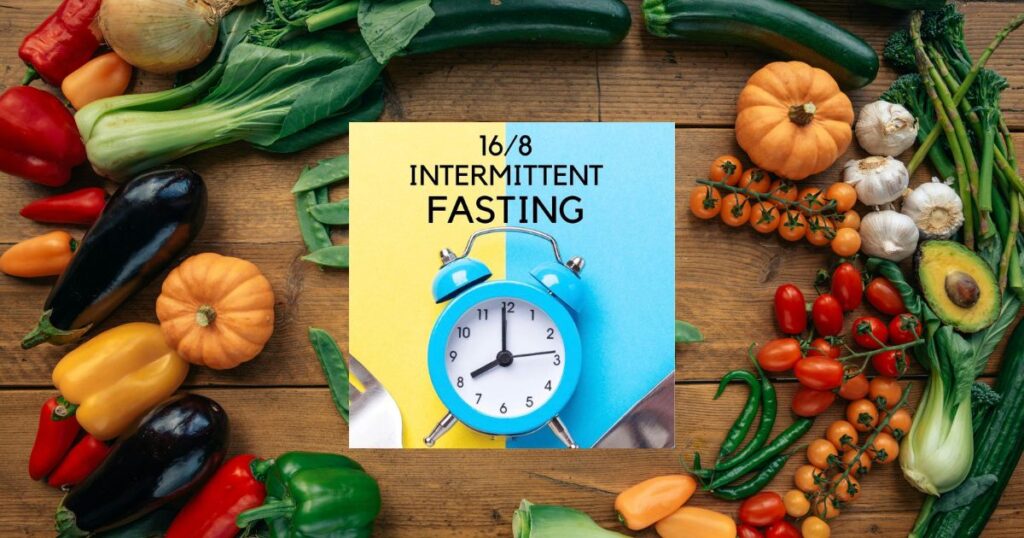What is 16/8 intermittent fasting?
The Best Time for 16/8 Intermittent Fasting: A Beginner’s Guide
Welcome to our blog post. Here, we talk about health and wellness intimating which time is best for 16/8 intermittent fasting. Today, we are diving into intermittent fasting, dealing with the popular 16/8 method. If you are over 18 and looking for a simple yet effective way to boost your health and wellness journey, you are in the right place.
Read more: What is 16/8 intermittent fasting?
What’s in this Blog post?
What is 16/8 Intermittent Fasting?
Intermittent fasting involves cycling between periods of eating and fasting. The 16/8 method is one of the most popular forms, where you fast for 16 hours and have an eating window of 8 hours each day. During the fasting intervals, you consume zero or minimal calories, typically drinking water, tea, or coffee.
Benefits of 16/8 Intermittent Fasting:
- Weight management: Helps control calorie intake and promotes fat loss.
- Improved metabolism: This can boost metabolic rate and enhance fat-burning processes.
- Blood sugar control: This may enhance insulin and reduce blood sugar.
- Mental clarity: Some people report increased focus and mental clarity during fasting.
- Simplified eating: Limits overeating and promotes mindful eating habits.
Which time is best for 16/8 intermittent fasting?
The best time for 16/8 intermittent fasting can vary depending on individual preferences and lifestyle. However, many individuals align their fasting window with their natural circadian rhythm. Quite often, starting the fast after dinner and fasting through the night until mid-morning or lunchtime.
For example, by finishing dinner around 8 PM, you can start and break your fast at noon the next day. It allows an 8-hour eating window from 12 PM to 8 PM, which fits many people’s schedules. Our earlier blog post on this subject of intermittent fasting beginners guide is also relevant in this context.
Tips for Success:
- Keep hydrated: Drinking lots of water while fasting keeps you hydrated.
- Choose nutrient-dense foods: Focus on whole foods like fruits, vegetables, lean proteins, and healthy fats during your eating window.
- Listen to your body: Pay attention to hunger cues and adjust your eating window if needed.
- Be Firm & Bold: Tightened fasting approaches with a firm commitment will yield the best health results
- Consult a healthcare professional: If you have any medical conditions or concerns, consult a healthcare professional before starting intermittent fasting.
Debunking Common Myths About Intermittent Fasting:
As intermittent fasting continues to gain popularity, it Is essential to address common myths and misconceptions surrounding this dietary approach.
- Myth: Intermittent Fasting Slows Down Metabolism
Some people believe that skipping meals or fasting periods can slow down metabolism. However, research suggests intermittent fasting has had an affirmative impact on metabolic health. When the body enters a fasting stage, it becomes more efficient at burning fat for energy. It can contribute to weight loss and improved metabolic function.
- Myth: Intermittent Fasting Leads to Nutrient Deficiencies
Concerns about nutrient deficiencies often arise when discussing fasting periods. It is essential to consume a balanced diet at eating windows. It does not inherently lead to nutrient deficiencies. In fact, by focusing on nutrient-dense foods during meals, individuals can meet their nutritional needs while reaping the benefits of intermittent fasting.
- Myth: Intermittent Fasting is Unsuitable for Athletes
Another misconception is that athletes cannot benefit from intermittent fasting due to energy levels and performance concerns. However, many athletes have successfully incorporated intermittent fasting into their training routines, adjusting their fasting and eating windows to optimize performance and recovery. With proper nutrition and hydration, intermittent fasting can support athletic goals.
- Myth: Intermittent Fasting is Only Meant for Weight Loss
While weight loss is a common goal associated with intermittent fasting, its benefits extend beyond just shedding pounds. Intermittent fasting aids insulin sensitivity, blood sugar control, cognitive function, and overall metabolic health. Individuals of various body compositions and goals can benefit from intermittent fasting.
Exploring Variations of Intermittent Fasting:
Beyond the 16/8 method, there are several other variations of intermittent fasting that individuals may consider based on their preferences and lifestyle.
- Alternate-Day Fasting (ADF): ADF involves alternating between fasting days, where individuals consume minimal calories or no food, and non-fasting days, where they eat as usual. This approach can be weight loss and offers metabolic benefits such as continuous calorie restriction.
- 5:2 Fasting: In the 5:2 fasting protocol, individuals eat five days a week and restrict calorie intake to around 500-600 calories on two non-consecutive fasting days. This pattern allows for flexibility while promoting calorie reduction and potential health improvements.
- Extended Fasting: Extended fasting involves fasting for longer periods, typically 24 to 72 hours or more. While this approach may offer profound metabolic benefits and autophagy activation, it requires careful planning, hydration, and monitoring for safety.
- Time-Restricted Eating (TRE): Time-restricted eating focuses on limiting the daily eating window, similar to the 16/8 method. However, individuals may choose narrower windows, such as 18/6 or 20/4, to enhance fasting benefits and metabolic responses.

The Role of Circadian Rhythms in Fasting:
Circadian rhythms, the internal biological clocks that regulate various physiological processes, play a significant role in the timing of intermittent fasting. Research suggests that aligning fasting periods with natural circadian rhythms, such as fasting during nighttime hours, may enhance metabolic outcomes and promote overall well-being.
Intermittent Fasting and Aging:
Aging is associated with changes in metabolic function, hormonal balance, and cellular repair mechanisms. Intermittent fasting has emerged as a potential strategy to mitigate age-related decline and promote healthy aging. By supporting autophagy, reducing oxidative stress, and enhancing mitochondrial function, intermittent fasting may contribute to longevity and vitality as individuals age.
Intermittent Fasting and Inflammation:
Chronic inflammation leads to various health conditions, including cardiovascular disease, diabetes, and autoimmune disorders. Intermittent fasting has reduced markers of inflammation in some studies, which may contribute to improved overall health and reduced disease risk. However, individual responses to intermittent fasting may vary, and further research is underway.
Addressing Concerns About Hunger and Satiety:
One common concern individuals have when starting intermittent fasting is managing hunger pangs and maintaining satiety during fasting periods. Strategies to address these concerns include:
- Consuming filling, nutrient-dense meals during eating windows to promote satiety.
- Incorporating fiber-rich foods, protein sources, and healthy fats supports appetite control and stable energy levels.
- I was staying hydrated with water, herbal teas, and other non-caloric beverages to curb hunger and maintain hydration.
Intermittent Fasting and Gut Health:
Emerging research suggests a potential link between intermittent fasting and gut health. Intermittent fasting may promote microbial diversity, improve gut barrier function, and modulate inflammatory responses in the gut. These effects could have implications against digestive health, immune function, and overall well-being.
Customizing Intermittent Fasting for Individual Needs:
It is important to note that intermittent fasting is not a one-size-fits-all approach. Individual factors such as age, gender, activity level, medical history, and dietary preferences can influence the suitability and effectiveness of intermittent fasting. Consulting with healthcare professionals, registered dietitians, or nutritionists can provide personalized guidance and support tailored to individual needs and goals.
Integrating Mindfulness and Intuitive Eating:
While intermittent fasting provides a structured framework for eating and fasting periods, incorporating mindfulness and intuitive eating principles can enhance the overall experience. Mindful eating involves paying attention to hunger cues besides cultivating a positive relationship between food and mind. Combining intermittent fasting with mindful eating practices fosters a balanced approach to nutrition and well-being. Your complete ketogenic diet meal plan has also significance in planning intuitive eating approach.
How did our ancestors survive ???
Our earlier generations were unaware of when they would get their next meal. They used to depend relentlessly on hunting and gathering to have their next meal. They visualized this unwarranted circumstance as a threat to their survival in action to protect themselves by catching holding of prey and various raw foodstuffs that included leaves, fruits, and vegetables.
Cleanse Up Mechanisms
Under those unmiserable living conditions, they were on a spree of allowing their bodies without knowing the consequences of stress and unaware of self-cleansing processes even after ignoring their sustenance naively. Their bodies got attuned to face those adverse conditions of hunger cues with the hidden potential of fasting naturally with a dual inbuilt mechanism of autophagy without much difficulty. Instead of harming themselves, their bodies became quick to cope with the instant satiety signals they had.
SWITCH OVER
Most of us would like comfort, convenience, and luxury over discipline. As a result, to a certain extent, sometimes, well-being gets compromised when we hop over processed food as one of our temptations. Of course, they remain a convenient path for us to fill our stomachs.
Collecting food from the workplace and placing food orders at the convenience of fingertips has become a regular phenomenon for many. Adopting these habits regularly without enjoying the meal in the comfort of home becomes not only detrimental but to emotional well-being as well.
However, on rare occasions, we should have the liberty of availing that privilege.
The Future of Intermittent Fasting Research:
As interest in intermittent fasting continues, ongoing research is on its way to explore its mechanisms, long-term effects, and potential applications in various health contexts. Areas of interest include:
- Investigate the impact of intermittent fasting on specific health conditions such as obesity, metabolic syndrome, neurodegenerative diseases, and cancer.
- Examine the effects of intermittent fasting on different populations, including children, older adults, and individuals with diverse cultural backgrounds.
- Explore optimal fasting protocols, meal compositions, and lifestyle factors to maximise the benefits of intermittent fasting while minimising potential risks.
Frequently Asked Questions:
The best time to eat during a 16:8 fasting schedule is up to personal preference.
The best intermittent fasting time for weight loss varies for each individual. It is recommended to consult with a healthcare professional or a registered dietitian to determine the most suitable fasting window for your specific needs.
You should start fasting at 16 8 at a time that suits your daily routine and preferences.
16 8 fasting can be effective for weight loss and improving metabolic health. To get the best results from this fasting method, follow these tips:
Maintain consistency: Stick to the 16-hour fasting window and 8-hour eating window every day.
Stay hydrated: Drink plenty of water during the fasting period to stay hydrated and curb hunger.
Eat a balanced diet: Focus on consuming nutrient-dense foods during your eating window to ensure you are getting adequate nutrition.
Control portion sizes: Pay attention to portion sizes and avoid overeating during your eating window.
Incorporate exercise: Regular physical activity can enhance the benefits of fasting. Include both cardio and strength training exercises in your routine.
Prioritise sleep: Aim for quality sleep of 7-9 hours each night to support overall health and well-being.
Listen to your body: If you experience any negative effects or discomfort during fasting, consider adjusting the fasting duration or consult a healthcare professional.
Remember, it is always a good idea to consult with a healthcare professional before making significant changes to your diet or fasting routine.
Conclusion:
Intermittent fasting, particularly the 16/8 method, offers a flexible and accessible approach to improving metabolic health, weight management, and overall well-being. By dispelling myths, exploring variations, understanding physiological mechanisms, and addressing individual needs, individuals can harness the potential of intermittent fasting to support their health goals and enhance their quality of life.
As research continues to evolve and our understanding of intermittent fasting deepens, integrating evidence-based practices, personalized approaches, and holistic lifestyle strategies will empower individuals to thrive and optimize their health span for years.
In conclusion, 16/8 intermittent fasting can be a simple yet powerful tool for improving health and wellness. Finding the best time for your fasting window is key, and aligning it with your circadian rhythm can enhance the effectiveness of this approach. Remember to listen to your body, stay consistent, and seek guidance if needed. With dedication and mindfulness, intermittent fasting can become a valuable part of your healthy lifestyle journey.







